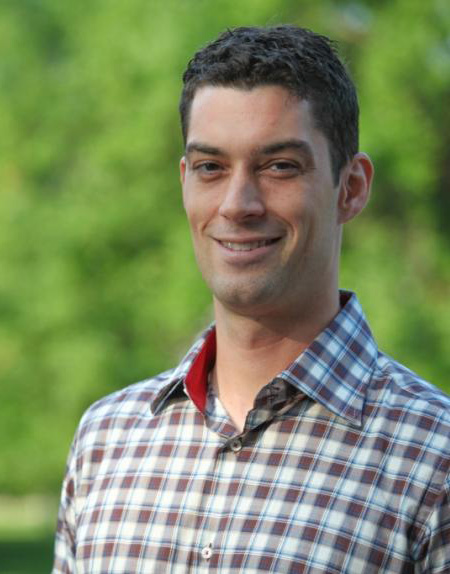 Chemistry professor Pete Kekenes-Huskey is a recipient of the Petroleum Research Fund Doctoral New Investigator grant from the American Chemical Society that supports fundamental research directly related to petroleum or fossil fuels. The $110,000 award will seed the development of computational models for predicting methane transport in zeolitic materials, which could help improve our ability to extract valuable chemicals from an abundant catalyst. Methane is a primary content of raw natural gas that is released as a byproduct of shale oil extraction and is a very useful precursor to sought-after chemical products, including more useful liquid hydrocarbons. Methane processing has been explored in zeolite catalysts, which are inexpensive, porous, highly adsorbent, naturally-occurring minerals. Zeolites are already valued at $30 billion for petroleum refinement, but for methane conversion they are of limited utility, given poor reaction kinetics and mass transport. A critical step toward realizing the industrial potential of these zeolitic materials is an improved quantitative understanding of molecular-scale methane/zeolite interactions and bulk permeation properties, which the lab plans to use as a basis for computer-guided characterization and optimization of zeolitic materials.
Chemistry professor Pete Kekenes-Huskey is a recipient of the Petroleum Research Fund Doctoral New Investigator grant from the American Chemical Society that supports fundamental research directly related to petroleum or fossil fuels. The $110,000 award will seed the development of computational models for predicting methane transport in zeolitic materials, which could help improve our ability to extract valuable chemicals from an abundant catalyst. Methane is a primary content of raw natural gas that is released as a byproduct of shale oil extraction and is a very useful precursor to sought-after chemical products, including more useful liquid hydrocarbons. Methane processing has been explored in zeolite catalysts, which are inexpensive, porous, highly adsorbent, naturally-occurring minerals. Zeolites are already valued at $30 billion for petroleum refinement, but for methane conversion they are of limited utility, given poor reaction kinetics and mass transport. A critical step toward realizing the industrial potential of these zeolitic materials is an improved quantitative understanding of molecular-scale methane/zeolite interactions and bulk permeation properties, which the lab plans to use as a basis for computer-guided characterization and optimization of zeolitic materials.
The proposal outlined two developments that could enable the simulation of methane transport in realistic, hierarchically-structured zeolite membranes and nanoscale assemblies: 1) micron-scale gas transport simulations in zeolites with framework defects and three-dimensional structure. 2) molecular simulations of methane/zeolite surface interactions at common zeolite defects. Quantitative predictions of methane transport from our modeling could inform zeolite catalyst design, while having a broader impact of new computational tools for potentially improving the performance of industrial catalysts.
For more information about the Kekenes-Huskey Research Group please visit the Kekenes-Huskey group webpages.
Kekenes-Huskey received his bachelor's degree from the University of North Carolina, Asheville, and his doctorate from the California Institute of Technology.
